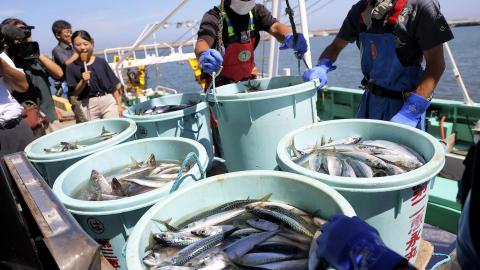Last week, Beijing announced it is suspending the import of all seafood products from Japan. The announcement came just after authorities in Japan started releasing treated water from its inactive nuclear power plant located in northeastern Japan.
The ban on Japanese seafood will not only impact Japanese fisheries but Chinese consumers as well. Forty-two percent of Japanese seafood exports go to China and Hong Kong, most of which are mollusks; 18% of China’s mollusks imports come from Japan. Unfortunately, Beijing may be more interested in the political impact of its decision than the economic effect it will have on either Japanese exporters or Chinese consumers.
Beijing’s argument is that Japanese authorities are acting “selfishly” and in total disregard for the considerations of the international community by releasing this water into the Pacific Ocean. However, not only have Japanese authorities worked closely with the international community throughout this process, Beijing’s targeted restrictions against Japanese seafood alone show the insincerity of China’s actions.
Tokyo Electric Power Company (TEPCO), which operates and manages the Fukushima Daiichi nuclear power plant, has been working with the International Atomic Energy Agency (IAEA) for years to ensure that the water it’s releasing has been treated appropriately. TEPCO says it will release water with no more than 22 trillion becquerels of the radioactive tritium per year — well below the standard set by organizations like the IAEA and below the level of tritium that already exists naturally in the ocean.
Unfortunately, Beijing’s rhetoric about food safety concerns runs counter to its actions. By one estimate, four of China’s nuclear reactors on its coastline release nearly 20 times as much tritium in the ocean per year — and yet, there have been no limitations on what Chinese fishermen can catch or concerns about radiation levels to date. And there are still no limitations on what Chinese fishermen can catch in the seas around Japan today. There are no limits on seafood imports in China from other countries such as South Korea, Taiwan or the Philippines — which all share waters with Japan.
There are reports that Tokyo will bring a dispute against Beijing’s actions to the World Trade Organization — though how this might help Japanese fisheries in the meantime is questionable.
Despite Tokyo being the obvious target for Beijing’s trade restrictions, it isn’t exactly clear what Beijing wants at this point — whether it wants something tangible from Tokyo or simply to discredit and politically harm its neighbor.
One reason for the trade restrictions could be that, just recently, Japanese Prime Minister Fumio Kishida met with President Biden and South Korean President Yoon Suk Yeol for a summit at Camp David. There, the three leaders criticized China’s dangerous and aggressive behavior in the South China Sea — which also happens to be an important region for Chinese fishermen.
Another reason could be that this may drive a wedge further between Kishida and his political party, the Liberal Democratic Party (LDP), and Japan’s fishing industry, which was already opposed to the release of the treated water. Just like when Beijing targeted American farmers with tariffs during the U.S.-China trade war, Beijing may be targeting the LDP’s political supporters in an effort to exert maximum political cost on the Kishida administration and impact public opinion. There is speculation that Kishida may call for an early election this autumn and already his disapproval rating has been growing.
One other reason could be that China has its own history of food safety problems, with regular outbreaks of avian and swine flu, to name a couple. Beijing may simply want to take this opportunity to point a finger at a food safety concern that’s not originating at home.
Regardless of an underlying reason, it would be naive to think China would not be using this event to target Japan’s image. As the current U.S. ambassador to Japan, Rahm Emanuel, once said: Never let a good crisis go to waste. Whether or not there was a Camp David summit, whether or not there is domestic opposition to the release of the treated water, or whether China’s economy is gearing toward stagnation, Beijing would not let this opportunity to undermine Tokyo’s credibility go to waste.
This isn’t the first time that Beijing and Chinese netizens have rallied together to voice anti-Japan sentiment. In 2012, a dispute over islands sparked a diplomatic dispute between Tokyo and Beijing and instigated anti-Japan sentiment throughout China. The events led to protests and vandalism against Japanese businesses and products across China. And now, Japanese are facing new instances of harassment in China and at home.
Just like in 2012, Beijing may do the bare minimum to protect Japanese citizens as it allows anti-Japanese sentiment to grow. It may even continue to fuel some of its domestic anti-Japanese sentiment as it continues to spread misinformation about the safety of the treated water that’s being released.
Even if Beijing is given the benefit of doubt, assuming that it cares more about the safety of seafood coming from the seas around Japan, there may be little it can do to convince the international community otherwise. Beijing’s continued use of trade restrictions, especially on agriculture and food products from other countries, in addition to its increasing diplomatic belligerence, has discredited any legitimate concerns it actually may have. In places like Tokyo and Washington, there’s little trust in what Beijing has to say anymore.
In May, Japan, along with the U.S. and other Group of Seven members, released a statement warning that incidents of economic coercion like this were on the rise as countries like China exploit economic vulnerabilities for political purposes.
This week, Ambassador Emanuel traveled to Fukushima to eat locally caught seafood in a show of solidarity with Japan. And President Yoon ate seafood to reassure South Koreans that locally sourced seafood is safe to eat.
The U.S. and others should support Tokyo as it continues to reassure domestic and international markets that its seafood is still safe to consume.















